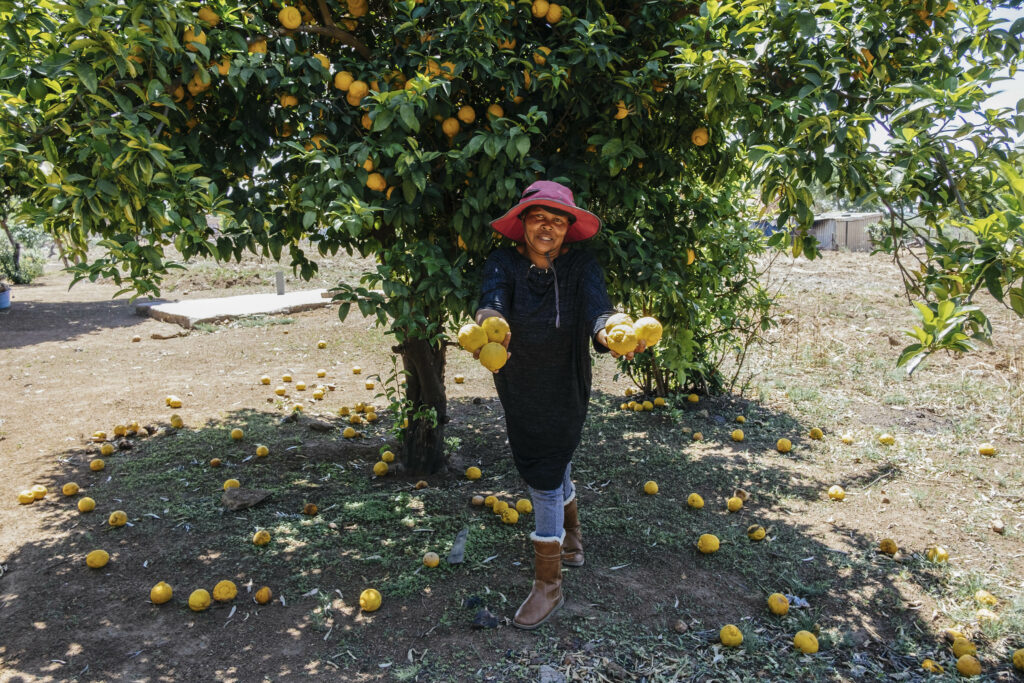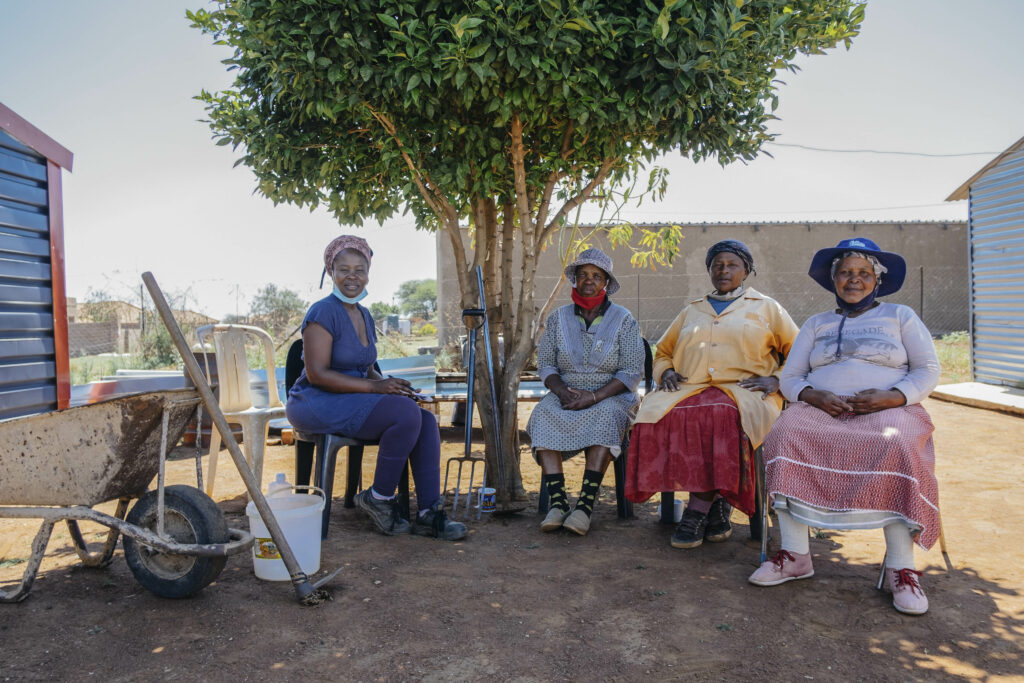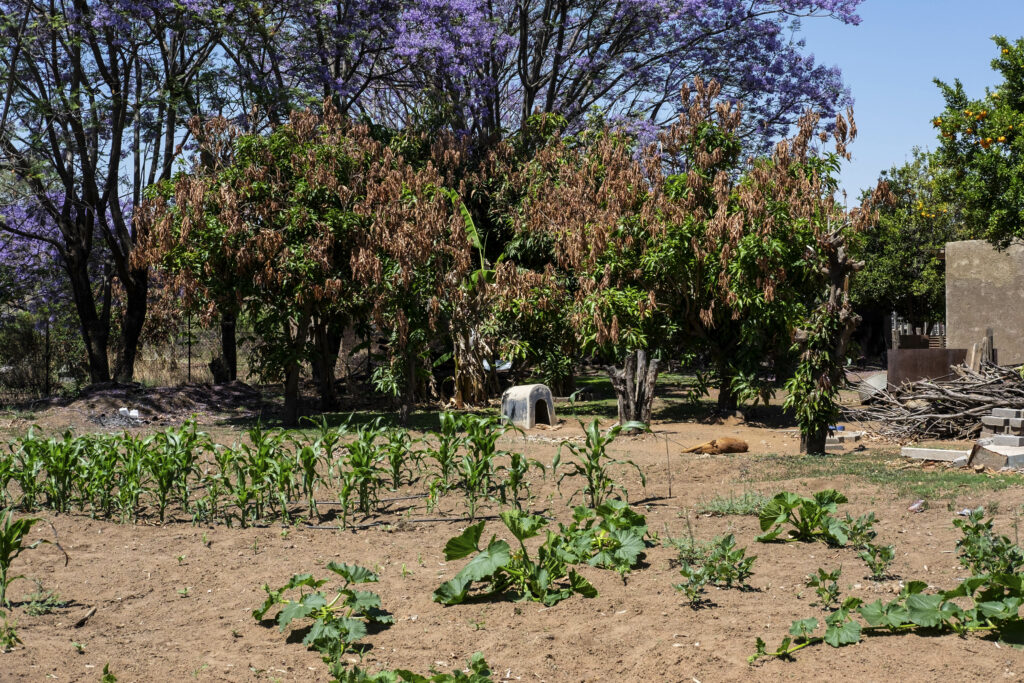Helen Moloto, 53, inspects the celery she grows on her smallholding in Kgabalatsane, North West Province. She supplies some of her produce to the Hebron Mango Tree Owner's Company. (James Puttick)
In the searing midday heat in Kgabalatsane village in the North West, Helen Moloto says she has no choice but to run her sprinkler at full blast. It’s either that or her organic crops will wither and die.
“In agriculture, you don’t water at this time, but what else can we do,” says the small-scale farmer. “We need to cool the plants. The temperatures are too hot and the soil becomes very dry quickly.”
Moloto lives in a century-old farmhouse built by her great-grandfather on a plot “big enough to farm for everything”. It bursts with an assortment of herbs and vegetables. One portion is devoted to traditional vegetables that are better able to withstand harsh environmental conditions, she says.
But it’s her rain-fed mango trees — now partly burnt by an unseasonable frost — that led her to the Hebron Mango Tree Owners Cooperative. Mangos grow in the yards of households across Kgabalatsane and in nearby Hebron.
The cooperative is part of a GenderCC Southern Africa-Women for Climate Justice initiative that seeks to build the capacity of 6 000 smallholder farmers in the Hebron and Vhembe districts in Limpopo
to supply high quality, sustainably produced green mangoes to the Hebron cooperative and the Vhembe agro-processing cooperatives. The GenderCC mango initiative is supported by the government of Flanders and the department of forestry, fisheries and the environment.
For GenderCC, the project is about “closing the gender gap” and bringing women into the forefront in the fight against climate change, poverty, and inequality. It provides technical assistance, training, capacity building, advocacy and awareness to the small-scale farmers on climate adaptation in agriculture, water and ecosystem and natural resources. This includes seasonal crop farming, crops suitable for the area and gender-responsive climate smart agricultural practices such as hydroponics and aquaponics.
 Helen Moloto shows off the lemons she grows at her smallholding in Kgabalatsane in the North West Province. She grows fruit, vegetables and herbs on her land, which she supplies to the Hebron Mango Tree Owner’s Company. (James Puttick)
Helen Moloto shows off the lemons she grows at her smallholding in Kgabalatsane in the North West Province. She grows fruit, vegetables and herbs on her land, which she supplies to the Hebron Mango Tree Owner’s Company. (James Puttick)
Climate change, the organisation says, is already hitting the North West and Limpopo hard. Here, the once thriving agricultural sectors are experiencing extreme weather patterns — droughts, floods, extreme temperatures, shorter growing seasons, increased exposure to pests and various crop diseases.
“As with the other provinces, the primary channel through which climate change is affecting the two provinces and South Africa as a whole is through water availability and security, due to reduced rainfall,” says GenderCC. This directly affects other key socioeconomic sectors such as agriculture, food security and livelihoods, biodiversity and ecosystems.
Moloto remembers that when she was growing up, the rains started in the first week of August, which was followed by planting. “Now the rain is only coming in October. We don’t know the time to plant and we are confused,” she says, as she sips on homemade orange juice from fruit plucked from her citrus trees. “Climate change is affecting us a lot. We have big problems with water here.”
 Members of Tsholofelo Basadi Ba Kgabalatsane (“Hope for the Women of Kgabalatsane”)(from left to right) Mamosa Jasson, 47, Helen Tshepe, 75, Maria Nakedi, 56, and Jemina Moloi, 66, at their smallholding in Kgabalatsane in North West Province. The women generate a stream of their income supplying produce to the Hebron Mango Tree Owner’s Company. (James Puttick)
Members of Tsholofelo Basadi Ba Kgabalatsane (“Hope for the Women of Kgabalatsane”)(from left to right) Mamosa Jasson, 47, Helen Tshepe, 75, Maria Nakedi, 56, and Jemina Moloi, 66, at their smallholding in Kgabalatsane in North West Province. The women generate a stream of their income supplying produce to the Hebron Mango Tree Owner’s Company. (James Puttick)
Lesego Hlalethoa, a fieldworker for the Hebron Mango Tree Owners Cooperative, explains how, in 2016, a group of local women formed the cooperative after realising the collective value of their mango trees could help nurture food security and fight poverty through sustainable farming practices and diversified enterprise development.
“They realised that around his area there are a lot of mango trees in these households, and the citrus, most of it was going to waste, which is not good for the environment. And they thought, ‘how about we form a cooperative and become a wholesaler’ — we buy from the households and then resell in bulk,” says Hlalethoa.
The cooperative now involves about 1 000 women small-scale farmers. “In our cooperative we turn green mango into cash by collecting — buying — them from the community households and selling it to the offtakers who produce achaar,” she says.
The Tshwane Fresh Produce Market has committed to take all the quality mangos that the cooperative supplies. Although the effect of Covid-19 has temporarily delayed some of the cooperative’s work, the focus is on building their business skills. The ultimate goal remains to own their own mango factory, where they can produce mango achaar, mango juice and dried fruit.
Beyond seasonal mango farming, there’s a focus on producing avocados and herbs, bee-keeping to produce organic honey, recycling, agricultural produce and livestock farming to “create thriving small to medium enterprises that are enabled by a climate resilient agricultural sector”.
 Mango trees showing brown leaves from frost damage grow together with other fruits and vegetables in a garden at Kgabalatsane in the North West Province. The Hebron Mango Tree Owners Company purchases produce grown in the gardens of local residents, helping to supplement incomes. Long term climate records show that there has been an increase in the incidence of extremely cold nights in the region, threatening the long term survival of mango trees in the area. (James Puttick)
Mango trees showing brown leaves from frost damage grow together with other fruits and vegetables in a garden at Kgabalatsane in the North West Province. The Hebron Mango Tree Owners Company purchases produce grown in the gardens of local residents, helping to supplement incomes. Long term climate records show that there has been an increase in the incidence of extremely cold nights in the region, threatening the long term survival of mango trees in the area. (James Puttick)
The project, says Bertha Chiroro, the director of GenderCC SA-Women for Climate Justice,brings women, girls and the most vulnerable to be the “leaders of finding local and viable solutions to the climate crisis”.
“Women’s leadership is paramount as the project inspires new women–led enterprises outside of the mango farming to ensure that there is diversified sources of income that will be explored outside the mango season and a way of adapting to a changing climate through the increase and support of eco-inclusive enterprises to increase climate resilience and ensuring that no one is left behind.”
When the project started, many of the small-scale farmers didn’t know about climate change, Hlaelethoa points out. “Now, they appreciate it and understand that if we cannot look after the environment, we are doomed because we live in this environment.”
Ben Masilo, the chairperson of the cooperative, says the project has a vital role in rural economic development: “We’re giving the community some lectures on soil erosion, harvesting water and on using the correct way of planting so when they plant they can reduce the impact of climate change.”
At a nearby small-scale farm, 70-year-old Helen Tshepe, seeks refuge from the heat under a tree. She is one of five all-women members of the Tsholofelo Basadi ba Kgabalatsane cooperative, which farms poultry and vegetables and hopes to soon draw an income from their project.
 Helen Tshepe, collects chicken eggs at the Tsholofelo Basadi Ba Kgabalatsane (“Hope for the Women of Kgabalatsane”) smallholding in Kgabalatsane, North West Province. The women of Tsholofelo Basadi Ba Kgabalatsane sell the eggs and use the chicken guano to fertilize their vegetable crops, thus maximising their income and crop yields. (James Puttick)
Helen Tshepe, collects chicken eggs at the Tsholofelo Basadi Ba Kgabalatsane (“Hope for the Women of Kgabalatsane”) smallholding in Kgabalatsane, North West Province. The women of Tsholofelo Basadi Ba Kgabalatsane sell the eggs and use the chicken guano to fertilize their vegetable crops, thus maximising their income and crop yields. (James Puttick)
“There’s a very big difference from when we were younger with this heat,” she says. “Our days were not like this. Now it’s too hot. Sometimes it rains very strongly for a few days and then it is gone. The soil is too hot and then nothing is growing.”
Ensuring gender equality and women’s rights, says Chiroro, is vital to fight the negative effects of climate change. “Women and girls and the vulnerable communities in South Africa are the shock absorbers of the climate crisis and the Covid-pandemic because climate change worsens existing vulnerabilities and gender inequalities as most women rely on natural resources for their survival.”
Women face unequal access to resources and the gendered division of labour and decision-making, which affects their ability to respond to the effects of the climate crisis.
“Women’s and girls’ voices should be amplified to find the adaptation solutions and responses that are gender-just to the climate crisis. That is why we call upon our leaders and everyone to ensure that there should be no climate justice without gender justice,” says Chiroro.
Hlalethoa tells of how the cooperative has big dreams for the next two to three years — hydroponic tunnels for pepper and tomato production; planting 3 000 mango and 3 000 avocado trees and producing more spinach, lettuce, broccoli, carrots and chillies.
The plan is to drill a borehole and install solar power or three-phase electricity from Eskom on the 10 hectare farm the cooperative has bought.
“Even if we have these challenges with water,” Hlalethoa says, “we always make a plan. That’s what women do — we make a plan.”